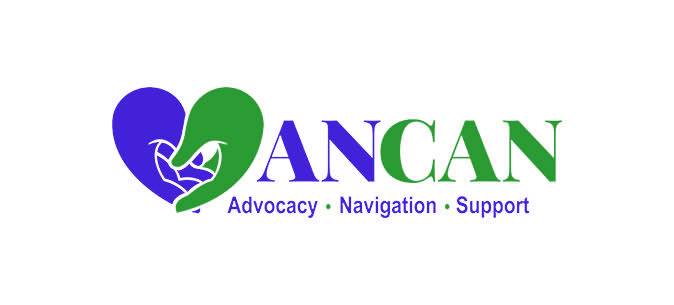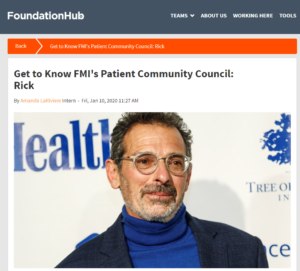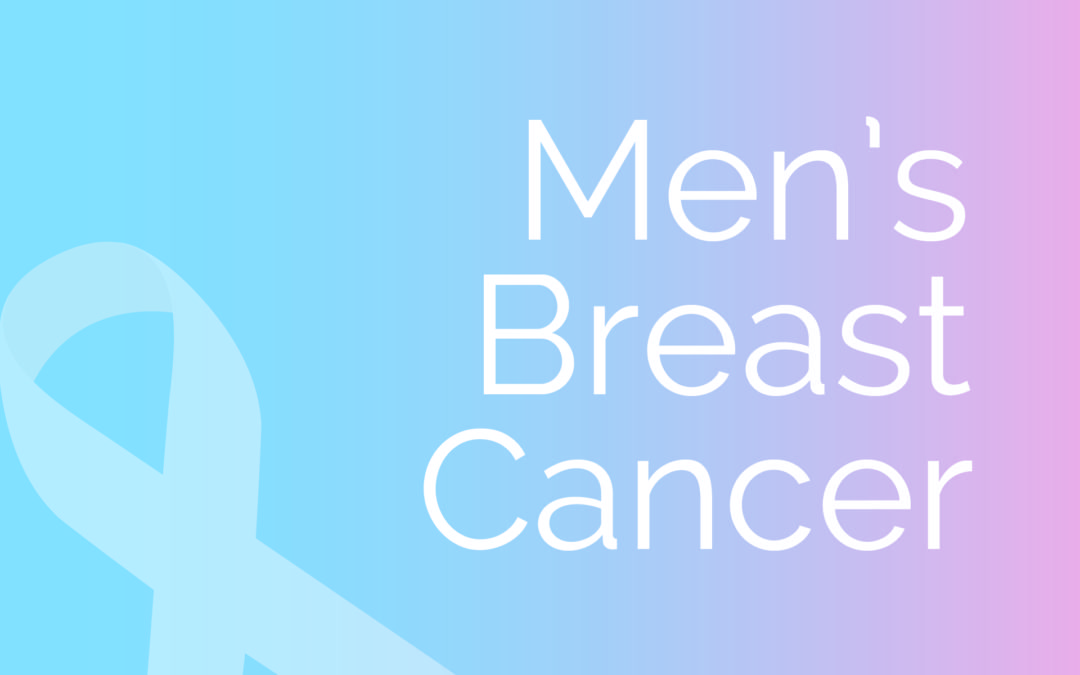
RD front pages Foundation Medicine’s ‘The Hub’
When in Boston mid-December for Foundation Medicine Inc’s (FMI) Patient Community Council, David Marshak and I sat down for an interview; David is FMI’s Senior Manager for Patient Engagement and a member of AnCan’s Advisory Board. FMI is gradually introducing all 5 members of the Council to their 1,500 employees; they want to encourage patient and advocate interaction to maximise FMI’s patient-centricity.
For those not familiar with FMI, it provides cancer genomic sequencing from either solid or liquid biopsies. Since 2018, FMI is a 100% subsidiary of Genentech that in turn is wholly owned by Roche. One item front and center on my radar is to initiate a repeat testing program for those who have already been sequenced once. Certain cancers, like prostate, are known to morph over time, so more than a single lifetime sequencing may be advisable.
Here’s the interview as it appeared in FMI’s online employee magazine FoundationHub earlier this month:

In December, 2018, FMI’s Patient Advocacy team launched the Patient Community Council (PCC). We have since been introducing patients and advocates on the PCC who work closely with FMI. Rick Davis is a member of our PCC and also leads the patient advocacy group AnCan. A longtime prostate cancer survivor, Rick reflects on the evolution of precision medicine, the importance of peer-to-peer support, and gives us a peek into his life in Southern Arizona. Read a full Q&A with PCC member Rick, below.
Can you talk about your diagnosis and treatment?
My own diagnosis was a total surprise. Largely because I had a doc who didn’t believe in PSA testing. Between tests, I went from a very low PSA to one that was quite high. It turned out that I had Stage III prostate cancer. I had to do a lot of treatment – two types of radiation and two years of hormone therapy. That was the bad news. The good news is, after the hormone therapy, I’ve had a durable and continuous remission, since 2010.
How did you get involved in patient advocacy?
As soon as I got my high PSA, I found a support group with a weekly meeting. I was living in Marin, California at the time. Within a year I was leading that meeting. That’s how I learned the ropes.
I started doing some advocacy at UCSF and then I got the idea to see what existed in terms of virtual online groups. Not written groups, but actual peer-to-peer conversations in real time. I found there was very little of that available. Building off of a community on Inspire (a health social networking site), we started having calls. Before long we were getting 10, 20, 30 people joining the calls, and it grew from there. We split the calls into more specific groups and added more meetings.
In 2016, our group split off and became a 501c3. We created Answer Cancer Foundation, which is now known as AnCan. We’re now running 8 prostate cancer groups a month, and we’ve got a few other groups too outside of prostate cancer.
What do the participants get out of the interactions in the virtual peer support groups?
I’d say a few things. First, we keep them up to date on technical advances in the field – whether it’s a new drug or a new test. Secondly, we help them in interacting with their medical professionals and taking charge of their treatment. If we had a catch line, it would be “you are your own best advocate.” And thirdly, we create a lot of camaraderie and peer support. Our meetings have to be peer-led. You’re talking about situations you’ve been through because that gives you credibility with everyone. They know you understand and they know you can relate.
What have been the major advances you’ve seen in precision medicine over the last few years?
I would say the major advancement in cancer treatment has been precision medicine. Precision medicine has really gotten established. I can remember 6 or 7 years ago, sitting in UCSF with a buddy of mine who was very sick, and talking about how he should get sequenced, and it seemed like a relatively new concept at the time.
What has it meant to participate in the Patient Community Council at Foundation Medicine?
I love your mission. I feel that a lot of the future of treatment will depend on germline or somatic testing. The opportunity to give you input and improve your interface with the patients is really rewarding. Because we hear from the patient side. If something’s not working, I’ll call you up and say – how can we improve this? Then you see the improvement happen. And then you don’t hear anything because it works.
Tell us about where you live
I live in Southern Arizona, 20 miles north of the Mexican border, in a small town called Tubac. My favorite part is the incredibly unique scenery. And the atmosphere and the ethos. It’s a really old community. There’s a trail near me that’s the original trail that the Spanish settlers took to trek up to San Francisco.
What are your hobbies?
I’ve been an endurance athlete for years. I do a lot of mountain biking and rowing. I’m probably the only rower south of Phoenix.
A recent book that you liked reading?
BJ Miller is a palliative care doc who’s also a triple amputee. He recently wrote a book called A Beginner’s Guide to the End. He’s a pretty amazing guy.
What’s something about you that most of your friends don’t know?
That I was a rugby hooker in high school. (Rick grew up in the UK.) It’s a position where you’re the little guy who’s right in the middle of the scrum. You just have big guys piling on top of you.
What advice do you have for someone working at FMI?
Admit to what you don’t know and ask for help. It’s a really good quality and it helps you gain respect.

